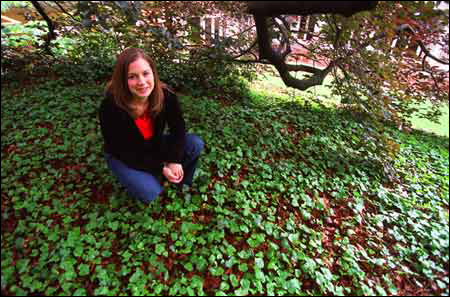Kristy Benoit ’04 proves that kindness is catching
Back home in Nova Scotia, she learned to work, and be kind

Kristy Elizabeth Benoit, who grew up in the tiny, close-knit community of Havre Boucher, Nova Scotia, never planned to attend Harvard College. She expected to keep with the local tradition: Stay in the province after high school and create a life for herself.
But a guidance counselor at Antigonish East High School was convinced that Benoit could succeed in the Ivy League and encouraged her to apply to Harvard.
Benoit will graduate today from Cabot House with an A.B. in psychology, magna cum laude. She plans to become a clinical psychologist, a career that would enable her to work with children and combine a practice with research. Benoit wrote an honors thesis on how children with anxieties process information.
“Every now and then, I have to step back from the picture and ask how I got here. I’ve been so lucky and had so many opportunities,” said Benoit. “Freshman year, I was so closed-minded. Everyone back home is white and Catholic. Harvard has broadened my mind, especially regarding other cultures and issues of diversity.”
Benoit was raised by Elizabeth and James Breen, whom she calls her grandparents because they also raised her mother. (“The Breens were friends of my maternal grandmother,” explained Benoit.) While it bothered her as a kid not to grow up with her own parents, she realized what a blessing it was during her Harvard years. “Some of my friends have divorced parents,” she said. “I grew up in a home with two people who loved my mother and me, as well as their own four children.”
The Breens also bequeathed her their work ethic and the wisdom that nothing comes for free. Benoit started working at age 14 to earn money for school clothes, sports trips, and other necessities. Admitting to being “bitter at the time” because “my friends didn’t have to work,” she can now appreciate the value of earning what you want.
Any conversation with Benoit is filled with references to her grandmother. “Her philosophy is be kind to others; it’s just something you do. When someone is sick or has a problem, she’s always the first person to call, visit, or prepare a home-cooked meal,” explained Benoit. “I can’t wait for my friends to meet her at Commencement.”
The kindness has clearly rubbed off. Since age 14, Benoit has used some of her earnings to sponsor a child in the Philippines through Foster Parents Plan. Getting letters from her child is “so cool. The youngsters appreciate whatever you do for them. If I can afford this during college, I should be able to continue for many years to come.” Benoit has worked part time at the Graduate School of Design library since freshman year.
Eager to combine travel with public service in a developing country, Benoit received a Radcliffe Traveling Fellowship after her sophomore year to work with Youth Guardians Inc. in Nigeria. She expected to work in a rural area with a nurse practitioner, but ended up teaching prisoners incarcerated in Lagos. Benoit taught biology and integrated science at a maximum-security prison for men and revamped the education program at the women’s prison while teaching math and English. James Granger ’05, a Harvard student Benoit met the day after she arrived in Nigeria, taught with her.
“My family was anything but thrilled, but the students were so respectful. They chose to be in class. They carried my school bags, erased the board. Little things like that,” she said. “Some of the men I taught were well-educated; they were imprisoned for selling drugs to fund their education. The penalty for selling drugs in Nigeria is very harsh. But I also taught men who committed murder, attempted murder, armed robbery, and rape.”
According to Benoit, the most rewarding aspect of her Nigerian experience was “seeing how positive an outlook people can have when their situation is so dire. The prisoners appreciated whatever you did for them. Some of them had to wait 10 years for a trial, only to be released because they were innocent.”
Benoit’s public service efforts aren’t limited to foreign countries. At Cabot House, she worked with other students to assist Maria Guerrero, who worked in the dining hall and was diagnosed with cancer. “Maria was an incredible inspiration to me. Without a doubt, she was the closest thing to an angel. Maria faced her illness and her imminent death with such courage, hope, and faith,” said Benoit, who helped coordinate transportation and translation services for Guerrero and babysitting services for her two daughters. “On her last day of work, we gave her a party and a big poster of a sunflower signed by everyone. The poster was the only possession she insisted that her family keep. It meant so much to her.”
Commencement, with all its pomp and tradition, means a lot to Benoit because her parents, the Breens, her paternal grandparents, an aunt and uncle, and some paternal cousins plan to be in Cambridge today. She is also the first person in her immediate family to graduate from college.
After taking a year off to work, travel, and spend some time at home, Benoit plans to enroll in graduate school and earn a doctorate in child psychology. Where is the question. “There are great Commonwealth scholarships available for study in Australia, Great Britain, and New Zealand,” she said. “I might take advantage of them.”
In a few weeks, Benoit will return to her high school to be the guest speaker at commencement. “I’ve been wondering what I’ll say to the students,” she said. “Perhaps my message will be that if you have a goal and work hard, anything is possible.”




